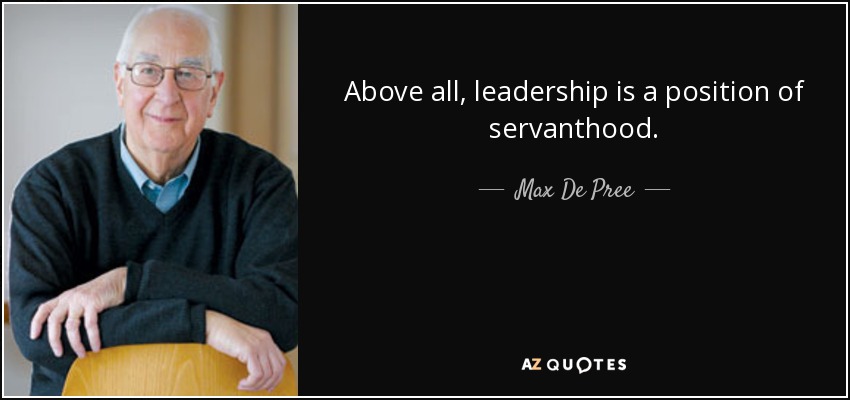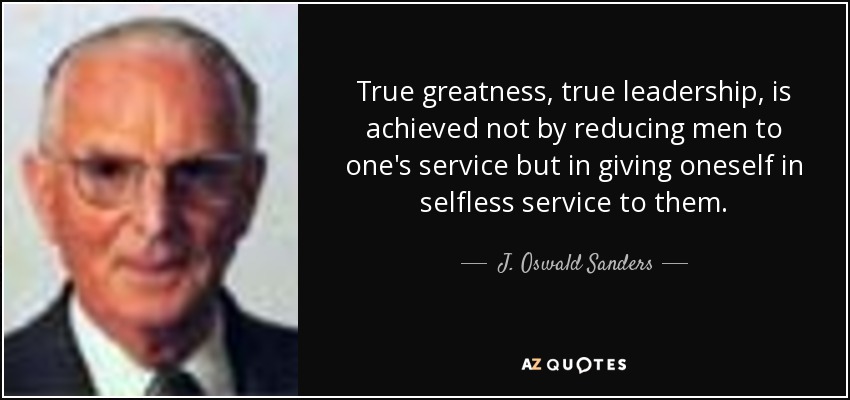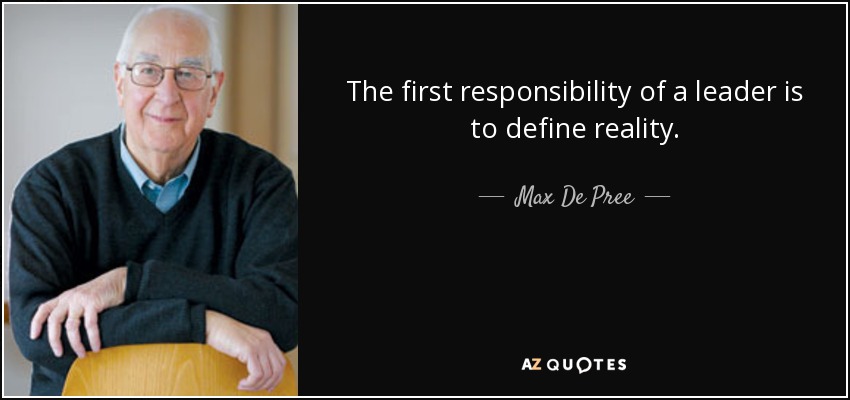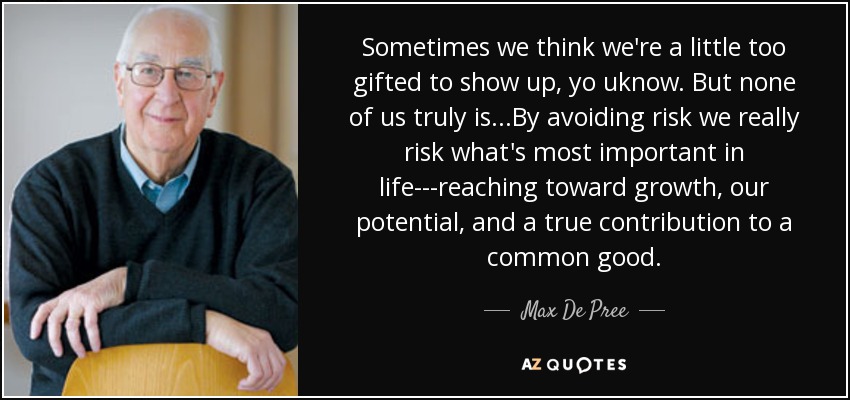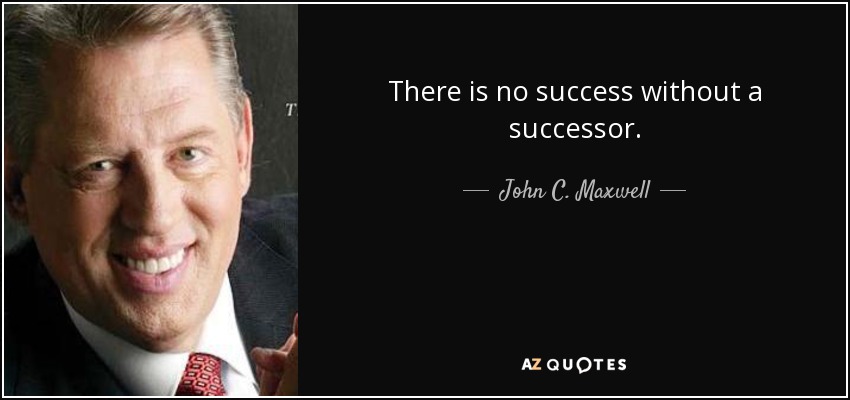Click here to return to Blog Post Intro
Down from the Head Table: A Call to Servant Leadership
In her book Jesus, CEO, Laurie Beth Jones explains, “The principle of service is what separates true leaders from glory seekers.”
Leaders often happily accept the status that goes with their position and develop a “head-table mentality,” thinking those who sit at the head table are somehow more important than those who serve in the kitchen. The true place of Christlike leadership is out in the crowd rather than up at the head table.
Too many organizations, homes, businesses, and schools struggle because they lack men and women who lead as Jesus did. Head tables have replaced the towel and washbasin as symbols of leadership among God’s people.
Fortunately, service-centered leadership has found its way into more recent discussions about leadership, as led by the writings of businesspeople like Robert Greenleaf, Peter Block, Stephen Covey, and Max DePree, who call leaders to a service-oriented model of leadership.
How Do We Lead by Serving?
A servant leader—serves the mission and leads by serving those on mission with him.
Mission is everything for the servant leader. The mission that God or someone in authority entrusts to the leader is the focus of every decision and action. This passion for the mission drives the leader to recruit and empower others to join him on that mission. A servant leader is also servant to those on mission with him.
The leader becomes servant to those who have joined him when he provides adequate vision, direction, correction, and resources to carry out the mission entrusted to the group.
Simply put: Servant leadership is passionate service to the mission and to those who join the leader on that mission.
The four operative concepts of servant leadership are: Mission, Vision, Equip, and Team.
- Mission is God’s call on your life. You know what your mission is when you can complete the statement, “God called me to _____________________________.”
- Vision is your unique take on that mission. You can state your vision by completing the statement, “When the mission is complete it will look like this: ______________________________.”
- Equip is how you train others to join you on mission to complete the vision.
- Team is how you mobilize those you have equipped to carry out the mission beyond your departure.
A servant’s heart allows the leader to put aside her own agenda in order to carry out that mission. Only a relationship with the Servant Leader, Jesus Christ, can produce such a heart condition.
Oswald Sanders, author of Spiritual Leadership, offers the following comparisons of natural and spiritual leadership tendencies:
| Natural | Spiritual |
| Self-confident | Confident in God |
| Knows men | Knows God |
| Makes own decisions | Seeks to find God’s will |
| Ambitious | Self-effacing |
| Originates own methods | Finds and follows God’s methods |
| Enjoys commanding others | Delights to obey God |
| Motivated by personal considerations | Motivated by love for God and man |
| Independent | God-dependent |
Submission to God and to the divine mission for your life is the first step to servant leadership. You will never become a servant leader until you first become servant to the Leader.
Principle #1: Humble Your Heart
This principle comes from Jesus’ story about choosing places of honor at a banquet.
In Luke 14:7-11, Jesus tells a story about choosing places of honor at a banquet and explains, “Servant leaders humble themselves and wait for God to exalt them.”
Jesus further explains in Matthew 18:4, “Whoever humbles himself like this child is the greatest in the kingdom of heaven.” This is the first principle of servant leadership: Servant leaders humble themselves and wait for God to exalt them.
As long as leaders worry about who sits at the head table, they have little time for the people they are called to serve. We don’t see opportunities for service while our eyes are fixed on the competition. Jesus taught that head table seats are “by invitation only” rather than “by hook or crook.”
The world says, “Work your way to the head table.” Jesus says, “Take a seat in the back. I’ll choose who sits up front.” Jesus taught humility because it was at the core of who He was. It enabled Him to follow God’s plan for His life.
The difference between pride and authentic confidence is the source. God grants confidence to those who trust him. Ego, on the other hand, produces pride. Ken Blanchard , coauthor of Lead Like Jesus, reminds us that ego stands for “edging God out.” He goes on to say, “When we start to get a distorted image of our own importance and see ourselves as the center of the universe, we lose touch with who we really are as children of God.” This “distorted image of our own importance” keeps us out of the lives of others and focused on what we alone want and think we need.
Learning to Be Humble; Learning to Wait
Servant leaders are humble and demonstrate the ability to wait. Humility begins when you have a true picture of yourself before God and God’s call on your life. Humility allows God to work in a person’s life.
The Bible contains many warnings against pride. For example:
- The Lord detests all the proud of heart.
- Pride goes before destruction, a haughty spirit before a fall.
- Better to be lowly in spirit and among the oppressed than to share plunder with the proud.
Richard Foster reminds us that “more than any other single way, the grace of humility is worked into our lives through the discipline of service.” Serving others, according to Foster, is, of all the classical spiritual disciplines, the “most conducive to the growth of humility.”
“Just do it” is not a servant leader’s mantra. God promised through his prophet Isaiah that “those who wait on the Lord will find new strength. They will fly high on wings like eagles. They will run and not grow weary. They will walk and not faint” (Isaiah 40:31).
Someone once said, “You cannot be impatient and humble.” It seems that impatience leads to reaction against events instead of waiting for divine direction. Humility and waiting are part of a servant leader’s lifestyle. A godly confidence combined with trusting patience allows the servant leader to carry out the mission of God in his life. Humility and patience equip him or her to carry out lifelong purposes.
The first principle of servant leadership—“servant leaders humble themselves and wait for God to exalt them”—does not come naturally. It is learned and nurtured over a lifetime.
Principle #2: First, Be a Follower
Jesus’ disciples James and John argued over who should sit at Jesus’ right and left when he came into His glory. In Mark 10:32-40, Jesus pointed out that “servant leaders follow Jesus rather than seek a position.”
Jesus led so that others could be followers
Jesus stated his intentions. Good leaders do. As the leader, Jesus also made his intentions clear.
Good leaders cultivate the ability to read current events and have a strong sense of what the future may bring. Great leaders take present circumstances and spell out potential scenarios from those factors. They seem to see what no one else can see. They paint a picture of the future (vision) for their followers.
People follow a leader who establishes trust. Stephen R. Covey developed what he calls a “Principle-Centered Leadership Paradigm.” Trust is the foundation of all effective relationships and organizations. Without a culture of high trust, true empowerment can neither be established nor sustained.
Warren Bennis claims that trust is one of the basic ingredients of leadership. “Integrity is the basis of trust, which is not so much an ingredient of leadership as it is a product. It is the one quality that cannot be acquired, but must be earned. It is given by coworkers and followers, and without it, the leader can’t function.” Trust is the foundation upon which relationships in every setting are built.
First a Follower: Are You?
Jesus’ response to James and John’s argument is the basis for our second principle of servant leadership: Servant leaders follow Jesus rather than seek a position.
Douglas K. Smith has written, “In the twenty-first-century organization, all leaders must learn to follow if they are to successfully lead.”
Biblical servant leadership never begins with the individual’s wishes to better the world or attain a personal goal. Servant leadership finds its motive from God’s commissioning a person to carry out a divine plan among a group of people. Becoming servant to the mission and a follower of the God who called you is the heart of servant leadership.
Jesus teaches that we learn to lead by learning to follow.
Principle #3: Find Greatness in Service
Jesus’ other ten disciples did not appreciate James and John’s boldness with Jesus. They learned from Jesus that “servant leaders give up personal rights to find greatness in service to others” (Mark 10:45).
In Matthew 20:26-27, Jesus said, “Whoever wants to become great among you must be your servant, and whoever wants to be first must be your slave.”
In John 13:33, Jesus addressed His disciples as children. This was not a put-down. It was a term of endearment. Children are precious to parents who love them. Jesus gave those who followed Him one commandment: to love one another (John 13:34). Parenting is a model of pastoral leadership. Leading includes both the nurturing and discipline that parents must balance with their children.
In They Smell Like Sheep, Dr. Lynn Anderson recaptured the biblical model of leader as shepherd. He reminds us that we do not have to fear the apparent dichotomy between leader and follower that this model may present. He addresses our fears when he writes: While some may not feel comfortable thinking of certain people as sheep and others as shepherds, our discomfort will likely disappear when we realize that the shepherding model revolves around the relationship between the shepherd and his flock. It is not a figure of strong over weak or “lords” over servants. Quite the contrary. The shepherd figure is one of love, service, and openness.
Jesus taught the third principle of servant leadership to His disciples: Servant leaders give up personal rights to find greatness in service to others.
Jesus exhibited paradoxical styles of leadership. He adapted His style according to those He addressed and the context of the situation: He was gentle as a lamb yet courageous as a lion. He was yielding yet aggressive when cornered by injustice. He was gregarious but spent much time alone. He was meek yet in control at all times. He never had a formal education, yet he taught with great authority. He was a conformist yet an iconoclast. He was a friend to the outcast yet dined with insiders.
Jesus railed against the leadership philosophy and style of “Lording over others” (subjecting them to your power). Authority is a leader’s vehicle of power. It gives him the ability to move others to action. If you choose this style of leadership, the first item on your to-do list is to get a bigger office. James MacGregor Burns notes, however, “All leaders are actual or potential power holders, but not all power holders are leaders.”
Richard Foster concludes that “the spiritual authority of Jesus is an authority not found in a position or a title, but in a towel.”
What Style of Greatness Do You Seek?
Peter Block, the author of Stewardship, calls for heads of organizations and companies to see themselves as stewards. Block asks leaders to have the goal of stewardship, not leadership. “Stewardship asks us to serve our organizations and be accountable to them without caretaking and without taking control.”
Jesus often made a distinction between how the world leads and how His followers are to lead (“not so with you”) among themselves. Please remember that what Jesus teaches about greatness and leadership cannot be expected of leaders who do not embrace Jesus as their final authority.
The test of whether or not you have accepted Jesus’ teaching about greatness is how you react when others treat you like a servant.
We live in a culture where the individual has been moved to the center of the universe. When that takes place, the rights of the individual reign over the needs of others. Until rights are relinquished, service is less likely to happen. Finding greatness in service begins by giving up your personal right to be served. This principle of servant leadership may be the most difficult to comprehend today.
One of Jesus’ core values for leadership can be summarized as “Greatness is defined by service” and “Leaders serve others first.” What are the core values for your leadership roles?
Principle #4: Take Risks
In John 13:3, Jesus teaches that “servant leaders can risk serving others because they trust that God is in control of their lives.”
Do you consider yourself a risk taker? What is the greatest personal risk you have taken? Your answers reveal the desire (or lack of desire) to move ahead and risk everything for your organization’s mission.
Next to His death on the cross, washing the feet of His disciples was Jesus’ ultimate model of servant leadership.
Kouzes and Posner describe leaders this way: Leaders are pioneers—people who are willing to step out into the unknown. They are people who are willing to take risks, to innovate and experiment in order to find new and better ways of doing things.
Here’s the fourth principle of servant leadership: Servant leaders can risk serving others when they trust that God is in control of their lives. When we trust that God is in control of our life, we can take big risks.
In his Jesus on Leadership workbook, Wilkes takes two weeks to develop the S.E.R.V.E. profile, acknowledging Rick Warren’s pioneering work in this area of helping people see how God has shaped them in order to find a place in ministry.
- Spiritual gifts are those gifts God gives through his Holy Spirit to empower you for service in the body of Christ. Freeing God’s people to serve as God has gifted them makes a church grow. Knowing how God has gifted you for service in the body will give you the confidence to take risks and pioneer new ministries.
Natural giftedness for leadership is not the same as spiritual giftedness for leadership. Natural giftedness is a mix of personality and skill. Spiritual giftedness is God’s empowerment, with a certain expression of his Spirit, to lead within the body of Christ.
God extends his call to leadership beyond those people who have a gift of leadership. If God has called you to a divine mission, God will provide the leadership resources to complete that mission.
Servant leadership as modeled and taught by Jesus allows for any gift to be used in a leadership role. Just as any one of the four personality types can be the core of a person’s leadership style, any of the gifts subjected to the mission of Jesus can be used to lead during a season of the church’s life.
- Experience is the second raw material God uses to mold you into a unique servant leader. Failures become avenues of success we never imagined when we trust God to work through every event to mold us. Events are God’s crucible to mold you into Christ’s likeness. Therefore, the best laboratory for leadership is life itself.
Faith allows the servant leader to trust that God’s mercy and purposes are greater than any hurt inflicted by others. This conviction makes it possible for servant leaders to learn from every experience in order to become the leaders God wants them to become.
- Your relational style is another aspect of how God has molded you into a unique servant leader. No one temperament is superior for leadership among God’s people.
God did not go looking for leaders. God looked for obedient people, whom He then formed into leaders. Effective leaders understand their own natural tendencies first and then take time to understand as best they can the relational strengths and weaknesses of those who follow them. An effective leader’s greatest act of service to those who are on his team is to create an environment in which natural strengths can flourish and weaknesses can be compensated for.
- God also uses your vocational skills as raw materials for servant leadership. You have skills that you can put to use in reaching and ministering to people in the name of Christ. Consider all the skills you have learned either from formal training or while pursuing a hobby.
We limit God when we do not invest all God has blessed us with.
- Enthusiasm is the last raw material God uses to mold you into a unique servant leader. Once we have humbled ourselves before God’s call on our lives, that call, in turn, becomes the wellspring of passion that makes us true leaders.
Here are the questions of enthusiasm: “What makes your heart beat fast?” and, “If you could do one thing for God, what would it be?” The answer to those questions will tell you the source of your enthusiasm for ministry.
The final reality that will give us confidence to risk being servants is that we, like Jesus, are returning to God. Jesus’ confession on the cross, “Father, into your hands I commit my spirit” (Luke 23:46), demonstrates that He trusted He was returning to His Father in heaven.
Trusting that God controls your eternity gives you the confidence to risk everything earthly to achieve anything eternal.
Principle #5: Take Up the Towel
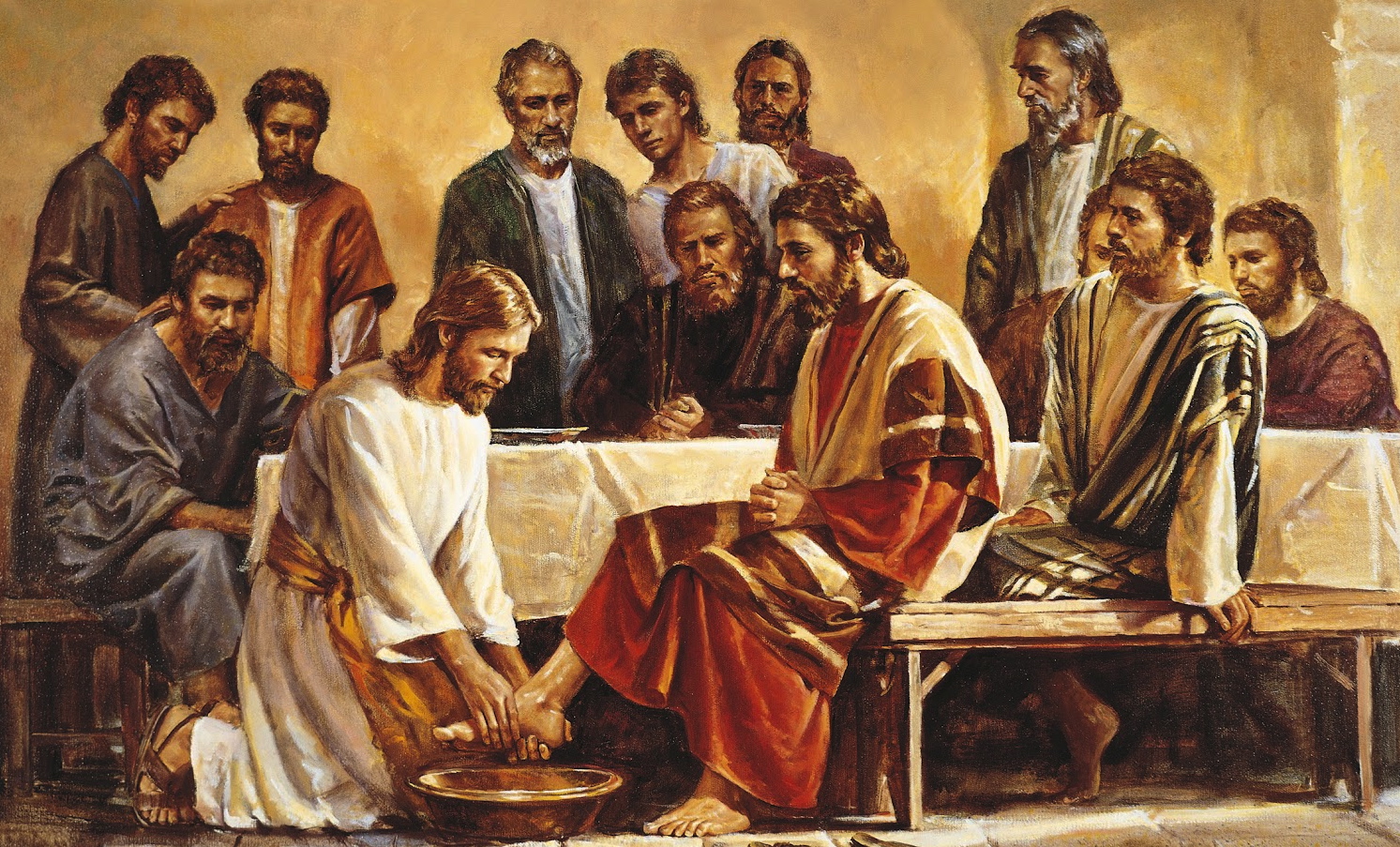
From His last Passover meal with His disciples, Jesus stepped down and took up the towel. In John 13:4-11, we see the fifth principle of servant leadership, “Servant leaders take up Jesus’ towel of servanthood to meet the needs of others.”
In the Book of Jesus, Martin Luther said, “In washing the feet of the disciples, Christ gave an example of love, for this is the nature of love—to serve and to be subject to one another.”
Our natural thinking is that leaders deal with the big issues and hire others to do the lowly tasks. Once again, we face a paradox of servant leadership.
When one becomes servant to the mission, that mission becomes the resolve that is the basis of strong leadership during critical times. One’s resolve to lead is directly proportional to one’s service to the mission.
Jesus came to show us the heart of God. His entire message and ministry on earth was to show selfish, power-hungry people like you and me what love looks like. As He knelt before Judas, Jesus showed us a love that no human can conceive on his own: a love that is brutally honest about what is going on but still kneels before us to lay down His life so we can be free from the sin that infects us. Jesus loves you as He loved Judas.
You will lead others as you model what you teach. If all you have to offer are words, few people will follow you. Your example will give them a picture of what you are talking about.
In his book Living Faith, President Carter tells how Jesus’ example leads us to live a life of service toward others. Reflecting on Jesus’ washing his disciples’ feet, he wrote, “This kind of image [Jesus’ washing the disciples’ feet] is profoundly important to me as I try, in my own way, to follow Jesus’ example: for instance, when I go with a Habitat team to build a house in Los Angeles or Chicago, inhabited by the poorest Americans, surrounded by drug addicts and criminals, sometimes with gunfire resounding on nearby streets…the awareness that my God walked this way before me makes it possible to sustain such an effort.”
Leadership means staying true to the mission, not necessarily to the wishes of the people—even the majority of the people. Wilkes explains that he now lives by this axiom: “You cannot lead by consensus, but you must have consensus to lead.” Consensus is a by-product, not a method, of good leadership.
Principle #6: Share Responsibility & Authority
Acts 6:1-6 shows the sixth principle of servant leadership: Servant leaders share their responsibility and authority to meet a greater need. Jesus equipped his disciples to carry out a worldwide vision.
In They Smell Like Sheep, Lynn Anderson put it this way, “Good equippers do it like Jesus did it: recruit twelve, graduate eleven, and focus on three.”
John Maxwell wrote in Developing the Leaders around You, “The ideal equipper is a person who can impart the vision of the work, evaluate the potential leader, give him the tools he needs, and then help him along the way at the beginning of his journey.”
Jesus shared a big, hairy audacious goal (“BHAG”) with His disciples just prior to His ascension to heaven. Jesus’ BHAG for his followers was to make disciples of all nations. Yes, all nations.
Every great event in God’s history with His people began as an audacious goal that seemed impossible until people trusted God and acted on the divine word.
If we read the mission as “Go and make disciples of all ethnic groups,” we may better understand the declaration to the first disciples.
Genuine delegation leaves the details to those entrusted with their part of the mission. Here are five steps to equip others:
- Encourage them to serve;
- Qualify them to serve;
- Understand their needs;
- Instruct them; and
- Pray for them.
Encouragement without training is like enthusiasm without direction: You move around a lot, but little gets done! Servant leaders qualify those they encourage to join them on mission.
Paul gave Timothy the “2-2-2 Plan for Discipleship” from 2 Timothy 2:2. The pattern of sharing the message of Jesus as outlined by Paul was: Paul—Timothy—Reliable Men—Others. A contemporary model of Paul’s instructions would be: Your Mentor—You—Faithful Members—Others.
No servant leader should stand to lead until he kneels to pray with those he serves. Prayer gives discernment, protection, and power to those who lead. Prayer is the source of vision, direction, correction, and resources for mission. Servants to the mission must stay on-line with their Master in order to complete that mission. Prayer is the greatest source of strength for the servant leader.
Principle #7: Build a Team
From Mark 6:7, we see the seventh principle of servant leadership: Servant leaders multiply their leadership by empowering others to lead.
Lynn Anderson put it this way in They Smell Like Sheep, “Good spiritual leaders are shepherds, not saviors, leaders not lords, guides not gods.”
Leaders must involve others to reach a shared goal, and they fail when they put too much trust in their own efforts and those efforts alone. You will never be an effective leader until you include those you lead in what you do.
Jesus’ ministry on earth is a striking example of an important leadership principle: Mission continues when people are captured by it, equipped to do it, and “teamed” to carry it on.
Jesus seldom did ministry by Himself. He usually had at least three disciples with Him wherever He went.
Leaders build teams to multiply their influence. John Maxwell has demonstrated that a leader’s highest return is “forming a dream team of leaders.”
A committee is not a team! Be sure you understand the crucial distinction. Committees belong to an institutional structure and mind-set. They protect and guide the institution.
Teams, on the other hand, fit inside the structure and mind-set of a mission; they live not for an institution but for the purpose of reaching that mission goal. Committees control. But teams empower.
Team leadership embodies each of the principles of servant leadership:
- You must humble yourself in order to build a team.
- Humility allows you to see the need for others. Pride insists on working alone. You cannot seek a position and have the team succeed.
- Following Jesus keeps you on mission and out of competition with others. You must be willing to give up your personal right to be served and find greatness in service to the mission and the other team members.
- You must trust that God is in control of your life in order to risk service to those on the team.
- You must take up the towel of service to meet the needs of the group.
- You must share both responsibility and authority with team members in order to meet the greater need of the team’s goal.
- You must multiply your leadership by empowering other members of the team to lead.
Building a team involves these four steps:
- Create a Sense of Togetherness
One team had every player with this phrase printed on his undershirt under his uniform: “Big Team, Little Me.” This slogan said that every player was a part of the larger team, but no player found importance in himself above the others. “Big Team, Little Me” built a sense of togetherness.
Putting a team together means finding people who share a common goal with you but who may act and think differently from you. Unity in diversity is the biblical model for togetherness (1 Cor. 12:12). Every member belongs.
Too many churches are ineffective because they spend their time putting people on committees rather than building ministry teams to carry out their mission. A true team is formed for a purpose, and that purpose drives the team throughout its existence.
- Empower with Authority and Presence
Warren Bennis tells us, “Basic changes take place very slowly, if at all, because those with the power generally have no knowledge, and those with the knowledge have no power.” Empowerment is giving power to those with the knowledge and knowledge to those with the power.
Ken Blanchard, coauthor of The One Minute Manager, has captured the time it takes to empower someone in the title of his work Empowerment Takes More than a Minute! Blanchard teaches that one of the keys to empowerment is “to replace the hierarchy with self-directed teams.”
How does a person empower others with his or her presence? What did Jesus do? He spent time—long, deliberate time—with those who followed Him. If a servant leader is moving every two to three years, how much of her presence can she give to people? It takes five to seven years (unless you’re Jesus!) before people even trust you enough to begin thinking about your mission, much less adjusting their lives to carry it out!
- Account for the Mission ID and the Team’s Actions
Ken Blanchard writes, “Empowerment means you have the freedom to act; it also means you are accountable for results.”
Accountability is part of every disciple’s life. Jesus taught that every person will give an account to Holy God for his or her words and deeds. He said, “But I tell you that men will have to give account on the day of judgment for every careless word they have spoken” (Matt. 12:36). Paul reminded the Roman Christians that “each of us will give an account of himself to God” (Rom. 14:12).
- Be a Mentor
As John Maxwell says, “There is no success without a successor.” Wilkes personalizes his axiom this way: “You are not a success until you have a successor.”
Lynn Anderson reminds us that mentoring is an essential aspect of spiritual leadership. Anderson combines the mentor’s role with that of a shepherd when he writes, “Mentor, in one sense, is another dimension of shepherd, but with a different emphasis. Shepherds feed, protect and care for sheep; mentors pull up alongside human beings and model behavior, values, and faith through the shared life. While the shepherd motif is the ‘big’ model for spiritual leadership in Scripture, mentor is nonetheless essential.”
Jethro told Moses he was going to wear himself out unless he multiplied his leadership, he told Moses he had three responsibilities as a leader (Exod. 18:19-20). The first was to “be the people’s representative before God and bring their disputes to him.”
Jethro’s second injunction to Moses as an empowering leader was to “teach them the decrees and laws.” He had to define and articulate God’s plan for the people before he could enlist others to make decisions with him. Finally, Jethro said, “Show them the way to live and the duties they are to perform.”
Leaders wear out their followers and themselves when they try to lead alone. Stephen Covey observes, “People and organizations don’t grow much without delegation and completed staff work, because they are confined to the capacities of the boss and reflect both personal strengths and weaknesses.”
Writing for Promise Keepers, Howard Hendricks recommended that every man have three individuals in his life: “You need a Paul. You need a Barnabas. You need a Timothy.” Hendricks encourages each believer to have a Paul in his life because “you need someone who’s been down the road.” Every believer needs a Barnabas because you need someone “who loves you but is not impressed by you.” You also need a Timothy “into whose life you are building.”
Wilkes summarizes Hendricks’s points this way: You need a pastor, a partner, and a protégé:
- Pastor (not necessarily the paid professional kind) shows you down the road.
- Partner loves you but is not impressed by anything other than authentic relationship.
- Protégé enables you to pass on the mission God has placed on your life.
Mentoring is how servant leaders prepare the next generation of leaders for service. Unless there are future leaders, there is no future.
Contemporary Ideas about Servant Leadership
If you evaluated the religious leaders of Jesus’ time on effectiveness alone, their acumen in maintaining an institution and neutralizing a threat without cause should be highly rated. Those leaders practiced “lord it over” and “exercise authority over” leadership styles quite well. Jesus, on the other hand, demonstrated a new paradigm of how to exercise power and authority for missional purposes. His “not-so-among-you” leadership led to the Cross, not to places of prominence and power as we know them. His mission to lay down His life as a ransom for many was why He came, and that why influenced His actions and decisions. “Not-so-among-you” leaders submit their lives to Jesus, who assigns them to places and people in order to serve in His name.
Servant leadership as a theory and a practice will continue to grow and gain footing within leadership studies because people follow leaders who love and care for their followers’ well-being.
Wilkes’ prayer is that “Jesus’ example of being a servant who leads, motivated by love and obedience to his mission, will continue to grow among God’s people. Let us not force Jesus into our organizational models, but let us be changed by him, and by doing so, change those places and people we serve.”
May we glean timeless wisdom on Servant Leadership as we shoot for the stars!


